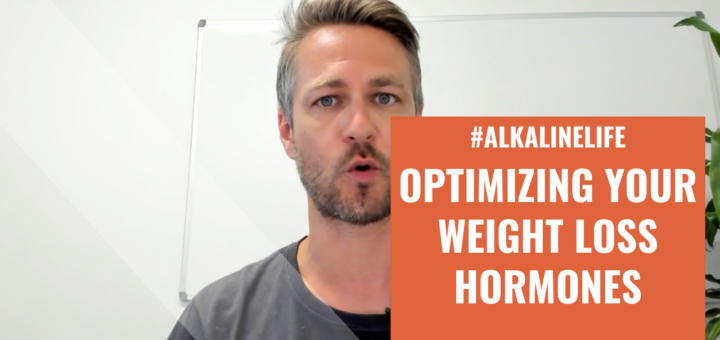Optimizing Your Weight Loss Hormones
Why Do You Always Feel Hungry, Yet Never Full…?
If you’ve struggled to lose weight in the past, it is NOT your fault. In my 20 years experience working with folks in The Alkaline Life Club, I have found almost every person who has struggled to lose weight has had a hormone imbalance caused by years of a Standard Modern Diet.
Weight is a SYMPTOM of imbalance in the body. When we address the imbalance the weight disappears. When we give the body the tools it needs to heal and effortlessly maintain balance, the weight will fall away.
In this video I share how.
My new book The Alkaline Life is coming soon.
Pre-order your copy here
Transcript
If you’ve struggled to lose weight in the past, it’s not your fault. And today I wanna share with you how to turn your body’s fat loss switch on. Hi, I’m Ross Bridgeford, the nutrition coach, author of the bestselling alkaline reset cleanse book, and my forthcoming book, the Alkaline Life. And today I wanna share with you a slightly longer but really important,
really powerful video training that I delivered for my private coaching group, the Alkaline Life Club. In this video, I’m gonna explain the exact role that your endocrine system has. This is the system of organs and glands responsible for regulating all of your hormones, the role that that has in supporting you losing weight, or if it’s causing you to gain weight and hold onto it.
I’ve written about this in loads of detail in the alkaline Lifebook, but when you are overweight, it means that there is an imbalance in your body. There is always a reason that sits behind your weight. Gain your body, the reason your body has to, to create fat cells and hold onto them. Excess weight is a symptom of imbalance in your body.
In my experience working with thousands and thousands of people over the last 20 years, especially women, there is always a role being played by your hormones. If we can find what this imbalance is and treat that imbalance and fix that imbalance with our diet and our lifestyle, the weight effortlessly falls away. And in this video we’re gonna explore this and I’ll share the steps with you that we can start to take to turn it around.
Again, this is a coaching video that I delivered from a private coaching group, the Alkaline Life Club. This is the sort of training we get into every week, and I hope you enjoy it. So why do we eat more than we need to eat? Why would we eat a meal and then go back for more? It’s interesting, and if you have been trying to lose weight over any period of time,
I’ve certainly been there. This happens to all of us, right? We weren’t wired this way. Over history, humans have been adaptable, was the fact that food was mostly scarce for most of history, food was scarce. You know, when we came across food, we ate it, we gorged on it, we got as much of it as we could because we didn’t know when the next meal was coming.
And that the human brain, then the body, our systems, our processes have evolved over so long to be able to deal with this. We can go through long periods of starvation without dying. Different processes shut down the body, utilizes different sources of fuel within the body. It’s not good for us, but we can cope, we can manage and we can survive.
And then when the next meal comes along, we can eat and the process repeats. But that’s not the modern world is it? We’ve never before had such access to so many empty calories, processed foods that offer almost no nutritional density, but so many, so much sugar, so much gluten, so many additives and chemicals. The foods are addictive, and our bodies and our brains are not able to cope with this.
They’ve got no means and no mechanism to be able to say no. We are literally not hardwired to say no. We’re hardwired to say yes and fuel and fill up as much as we can. This has become a real problem, a really interesting study that was done about 20 years ago. It’s called the Super Bowl study. So basically researchers put people into two groups.
They put one group who had a, a soup bowl that was sneakily self refilling. So every time someone had a couple of spoons of the soup, there was a little tube that went into the bottom and it just refilled the soup slowly back up to that level. And then people that just had a regular bowl of the soup. And what they found that was that the people in the refilling bowl group sub substantially more than the people in the control group because our brains saw that there were still loads left.
So we just keep going. We tend to eat however much as we can whenever we can. That’s how we are hardwired. And this is why if you have found yourself over eating, if you’ve got a history of overeating and you’ve beaten yourself over up over it, the theme that keeps running through this program, please stop. This is not your fault.
There’s four major issues that have caused the sensation of overeating and over consuming and eating and still going back for more and more and more. The first one is exactly that. It’s like our life is this bowl of self filling, filling soup. That access to foods that we have now is absolutely insane. There are options everywhere. There are options all the time.
And there are now home delivery services of your favorite foods. You know, in really five years ago, if you really, really had to have that certain food, you had to get dressed and get in your car and drive to the store, and we’ve all been there. I know that this happens. We’ve all been there. You would drive to the store and to get that food,
to get that fix. Nowadays within 15 minutes, you can have it delivered to your door. There’s coffee shops on every corner, really calorie dense nutrient poor foods are so cheap and so affordable. Now the availability is a major issue. The second major issue is the fact that these foods are so calorie dense and nutrient poor. When you, when your body is hungry,
that’s your body asking for nutrients. It’s not your body asking for a soda or a burger or fries or a pizza. It’s asking for nutrients. So when we stock up on nutrients, this is why my crowd out the bad philosophy works so well that we’ve talked about in this program and in this membership so often, because when you fuel your body with the good stuff,
it doesn’t want the bad stuff. It doesn’t crave the bad stuff. Have you ever been in the position where you’ve gone and you’ve had a takeaway, you’ve gone through the drive-through, you’ve done that and you’ve eaten it, and then 15 minutes later you are hungry again. You feel like, hang on, where did that all go? That’s because there is no nutrient density to this food.
So your body is going to then keep asking for more. It’s going to keep craving more because what it’s looking for is nutrients. If you’re getting high caloric intake, but zero nutrient value, there’s going to be issues. The third problem, artificial sweeteners. They are absolutely addictive. A spa team, and especially be careful, they are very, very good at giving these things different names and trying to get them reclassified as natural sweeteners and natural flavors.
They’re still, it’s just high fructose corn syrup. It’s just aspartame. It’s just those terrible, terrible sweeteners that give you the feeling that you are having something sweet and satisfying and filling, but the brain doesn’t recognize that you’ve consumed those foods that actually switch off that part of the brain that recognizes that the food has been consumed. So you literally stay as hungry as you were before you consume the food.
And then the fourth reason that’s such a big problem, and we’re gonna go be talking about this throughout the program, is those weight loss hormones, those hunger hormones, leptin and grilling. Lets, let’s get into those in a bit more depth right now. So these two hormones are super important in the weight loss puzzle. Leptin and ghrelin are affectionately known as the weight loss hormones,
all the hunger hormones, and they’re absolutely fascinating. So to keep it really simple at the outset, ghrelin is your true hunger hormone. It’s the hormone that signals to your brain that you are hungry and that you need to eat. So if there’s too much ghrelin, you’ll eat more than you need. Leptin is your society hormone or your starvation hormone. It’s the hormone that tells your brain that you are full and you don’t need to eat anymore.
So too, too little leptin and you’ll never feel full. And I say too little, but this is only part of the story as we’ll get into now. But you can see where I’m heading here. An acidic inflammatory standard western diet of gluten and sugar and processed foods and toxins and so on, leads to a situation very quickly where you’ve got too much ghrelin you need to eat and too little leptin.
You never feel full. You can see how fat is gonna make things a little bit tricky. So let’s jump in and look at them in a little bit more depth. So a ghrelin is a hormone that’s made in the stomach and it tends to rise before meals and fall after meals. It’s known as the only appetite stimulating hormone in humans. Ghrelin is one of the main contributors in giving people that insatiable cravings.
The the, the munchies if you like to eat unhealthy snacks. In addition, ghrelin is released directly in response to stress. So this is why so many people have this tendency to eat when they’re stressed. And here’s another link with cortisol. You’re gonna hear cortisol come up throughout this program by perpetuating cortisol release. Ghrelin contin contributes to weight by then returning the favor and stimulating the release of more cortisol,
ultimately giving you this unbeatable and unrelenting desire to eat and eat and overeat. So, so when I said at the start, if you feel like you are always struggling with cravings, you feel like you’ve got no willpower. This is just one of the reasons why I want you to know that this is absolutely not your fault. When your body and your brain are wired this way,
you just can’t control or direct it. We’ve been wired this way. And the more GH grilling that you have in your system, the hungrier you become, you’ll find yourself with cravings and you can’t seem to stay away from the fridge after dinner. This is due to the elevated GH grilling levels and the hard facts is that GH grilling works directly on the hunger sense of your brain by activating the brain’s reward response.
When you eat highly addictive, sweet, and processed and chemical-laden foods, you actually get a reward response. So again, it’s a vicious cycle. Now, leptin, on the other hand, is known as the starvation hormone because it notifies your brain when you’ve had enough food and your energy levels are sufficient. So because the body produces leptin based on your body fat percentage,
leptin is actually generated in the fat cells. Weight gain actually causes your leptin levels to increase, and weight loss will cause your leptin levels to decrease. So you would think more fat, more leptin. This is fantastic. No, this isn’t the case because leptin resistance exists. Leptin was only actually discovered in 1994, and you can imagine the glee when researchers discovered there’s a hormone that can tell people that they’re full,
the medical community falling off their collective chairs and trying to rub their hands together to create a synthetic version. You can just give people a leptin pill and they’ll be fine. And a big space race kicked off because that, let’s face it, would’ve been a multi-billion dollar industry. However, research soon discovered that it isn’t actually the amount of leptin in your body that is regulating this message of fullness because you can have all the leptin in the world floating around in your body,
your brain has to register it, the easy button disappeared. The problem isn’t a leptin shortage. The problem is the leptin signaling. It’s being blocked at the brain by insulin. So if you have got lots of excess weight, you’ve got a ton of leptin in your system, but you’ve also got tons of extra insulin, and so the leptin is being blocked with impaired leptin signaling,
your brain simply doesn’t get the message to stop eating. It doesn’t realize you’ve got enough energy, your brain thinks you are constantly starving and it’s driving you to eat more and more and more. The two primary causes of leptin resistance, like just said, elevated insulin. We are gonna address that abundantly in part two of this program. And inflammation in your hypothalamus and inflammation is going to be addressed very,
very quickly as well. The other thing is, when there’s low leptin levels reaching your brain, low leptin signaling, this actually encourages you to be sedentary as well. If you think about it from an evolutionary perspective, if your body is not receiving the signal that there is enough energy, that there is enough food that you’ve eaten enough, it’s going to encourage you not to burn energy.
So it’s going to keep you sedentary and it’s going to encourage you to overeat. Okay, leptin and ghrelin, you can see again why calories in versus calories out is sort of irrelevant when you look at the weight loss equation through the lens of these hormones. If you are constantly hungry and you are never full, it’s going to be hard. There is also a third hormone that I want to touch on called adiponectin.
This isn’t talked about enough in the weight and hormone discuss discussion, but this is literally the hormone that tells your body to switch on the fat burning, to use fat for fuel. If there is fat on your body that you want to get rid of, this is the hormone for you. So there’s many studies that have shown that the more adiponectin you have in your bloodstream,
the more you are gonna access fat as your primary energy source. Low levels of adiponectin, absolutely in the research associated with a higher incidence of obesity in the same way that the more fat you have on your body, the more leptin you have, the more cortisol and the more insulin you have annoyingly, the less adiponectin you have. And this is why it can be hard to sustainably lose fat when you first start out and why so many people get seduced into calories in versus calories out.
The other con, the other connection here is when your body is inflamed, when there’s at least one of the main five markers of inflammation in your body, your levels of adiponectin go down considerably. So we are gonna get this kickstarted for you in section two of the program, but for now, let’s just summarize. Eating an acidic, inflammatory toxic standard western diet,
the foods you know are not good of you, good for you, are gonna raise your insulin levels. They’re gonna cause insulin resistance, they’re gonna block leptin, they’re gonna increase cortisol, they’re gonna increase ght. It’s A vicious cycle. If you’re always hungry and you’ll never fall, you’re so much more likely to pick the wrong foods. It’s gonna encourage you to remain sedentary,
it’s gonna kickstart more insulin resistant, and it’s gonna lower your adiponectin levels and what’s compounding this inflammation and acidity, we’ve got to get on top of this. And again, we’re gonna address all of this quick smart in section two. Let’s move on to the next video. Now.





